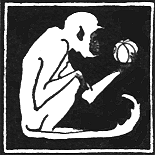 |  |
Wild at Heart Homepage | Contents | Previous Chapter
CHAPTER VI
HUNGER
1

As he sped across the field, flung himself over the treacherous ditch, and plunged once more among the dark trees, Nanga momentarily expected thunder and lightning at his back. He had roused man in the mass, and that meant muzzle-loaders.
But there was no explosion--only shouting, which rose like the babel of apes or the anger of bees and as quickly died. By the time he was well under cover the night wind brought no sound from the village.
He was in the big, silent sal forest--a grey underworld of straight trunks, ant-hills, rotting branches, and spiders’ skeins that he knew stretched farther than he could cover in a daylight running; and he was very tired. Now, there is no tree like a sal-tree for safe sleep, partly because it has no branches till the leafy top is reached, and partly because under it the ground is always dry and apt to betray sounds. So he chose a tall tree, ran up it like a monkey, and slipped into the natural cradle that the leaves offered, prepared, as his way was, to fall asleep instantly.
But--it was perhaps the strangest of that eventful night--sleep would not come. He composed himself; closed his eyes; relaxed his body; and...remained awake! That had never happened to him before.
Worse, though his eyes were closed, he nevertheless continued to see. He saw the terror leaping the stream; the new, bright playthings that he had held in his hands and yet had not held; and, most often, the face that had grown out of the air as his own face had so often seemed to grow out of water at drinking-time. The face in the water--he could always drive it away with his lips. But the face in the air--he could not be rid of that even by closing his eyes. It was very strange; and at times he grew angry and struck out with his hands; and at times he made the uncouth, throaty noises that served him for speech, challenging and flattering by turns. But the face still refused to allow him rest.
He ended by sitting up and chattering at it.
2
It was midnight, or past, when he heard a sound like a fitful wind stirring in the tops of the trees.
It was far away, down in the ravine by the river, but he knew at once that it was no wind. It was the sound of the langur troop making for the village by their accustomed route--the almost solid green way provided by the close packed sal-tops. Soon, very soon indeed, from what he knew, the rustling would grow into crashing and they would come upon him, for in open order they made a long line. Then they would try, he knew, to carry him with them, bounding from tree-top to tree-top, clinging and swinging and bounding again, as on many an other moonlit night. He had always reveled in those raids. To swing rhythmically from top to top in a great company; to be rid of the irksome ground and to lord it on high, rivaling the birds; to descend swiftly, swooping like hawks, on to wheat-field or bean-field, mango grove or orange garden; to devour with an appetite, then revel back to drink deep in the river--such things had made laughter in him. At such times he had even admired his ape brothers, for there had been no insipidity in them on those mad nights. They had been lords of creation. Yet to-night, wakeful and hungry as he was, he shrank back among the leaves.
He had done with them. He did not want to go with them.
Now he could see the tree-tops tossing. The oncoming was like a wave on water, a rough line of dancing leaves, with pale bodies rising and dipping all along it. To one who had seen the sea it would have seemed like the progress of a school of porpoises, the same even rise and plunge; and the crash of the boughs would have brought the very exhilaration of the sounds of the sea. But in Nanga there was no exhilaration. He watched the line dolefully, not daring to jump down, since thus he would even more certainly be seen; only hoping against hope that they might miss his tree.
He felt strangely forlorn; forlorn and small. There was something overpowering in the very multitude of them, all exactly alike, all doing exactly the same thing in the same way. They were a multitude; and he--he did not know what he was except that he was alone in the world, and would be forever alone, because he knew his companions at last for what they were.
They were on him now, spurning the tree-tops purposefully. A little furtive whisper was running up and down their ranks. “Soon, brothers, we shall be sitting at ease. Soon, brothers, soon. Full bellies--soon!” it seemed to say.
He knew it; how well he knew it!
With a crash a big, whiskered ape landed full on his tree. The hairy arm, searching for support, brushed his arm, and he cowered down, ready to drop to the ground and flee.
There was a moment of quivering suspense. It seemed that he must be seen, clutched, urged to join them.
But the big ape, intent on the business in hand, was in a hurry. It had hardly paused, muttering to itself, for purchase, before--crash!--the next tree was bending and swaying. There came no second ape. The line had passed on.
Soon all the trees were still again, save for a random twig here and there jerking back stiffly into place. The sounds, the muttering and the crashing, had merged again into one continuous rustle. Then that too passed, and he was alone. They had overlooked him. But he felt no relief, no thanksgiving; a great sadness, rather, for he had thrown away his last chance of comfort and company, and was the hungrier for the loss. He was indeed very hungry, but--here his face grew puckered and perplexed-not for food. What was this new emptiness that food could not fill?
The long hours passed, marked monotonously with the nightjar’s incessant call. “Chuckoo! chuckoo!” it called, and down the dewdrops pattered dismally. The moon, stealing downward now, made new shadows and new worlds under the trees; and mist was rising from the river and creeping everywhere. But still Nanga did not sleep, nor, for all his wakefulness, find the answer to his question. That hunger which filled not his belly but his head and his breast and his arms with an aching--whence came it? What was it?
3
At last, as if despairing of his problem, he slipped down from his tree and began to walk, not caring where he went so long as his back was turned on the home that he had shared with a multitude.
If Nanga’s feet led him back toward Kotahbagh, it was by no intention of his, unless some obscure instinct connected his present hunger with the experience of the earlier hours. For he wandered like a dreamer, moaning a little; stopping at times to stare at shadow or stone, as if they were strange to him; often making a cup of his hands and pressing them to his cheeks, and so standing still in perplexity. He never even saw the houses, rising out of their bed of mist a field’s breadth away, till a sudden sound in front of him recalled him to himself.
The apes again! They were coming back.

Once more he was caught, without time to flee. But now at least he had no fear of being carried with them, for they were engrossed, not in food, but in flight, a flight when it is each for himself and none for another. “Man! Man is coming!” was expressed in their demeanor, for they ran silently and did not pause to look behind, as they would have paused to look at a beast. Silently too they bounded past Nanga; and, though they must have seen him, not one of them showed a sign of recognition. So he lay down, watching in a bewildered way their retreating backs, wondering idly where the men might be.
There were no men about, it seemed. That was their way--to flee from nothing. And till now he had fled with them. But not again. He would share nothing with them henceforward, not even fear.
Stay, though. Stay.
This time they had not fled from nothing. There was something coming through the corn, not one of them, but something dark and upright. It too was fleeing, but not as they had fled. Jerkily, rather, with an odd sound of jingling; yet lightly enough. Man? Could this be man?
Man never walked lightly like this. Man blundered like a bear. This, then, could not be man. What was it that, moving so lightly, must belong to his own world, yet came fleeing from the dwellings of man?
He peered forward eagerly among the shadows. Now it was at the edge of the corn, looking this way and that; gone now, into the deep ditch; now clambering out. No climber, this! Now limping to and fro among the trees, flapping its hands, like the sloth-bear who cannot see ten paces in front of him. But this was no sloth- bear, either.
It was calling; making the same sound over and over, a pleasing sound like the note of some gentle bird, singing to itself...
Close, now!
It had a new scent, like nothing wild that lived; like, rather, the scent of the gum that he had crushed oftentimes to delight his nostrils. It was more pleasant even than the song, that scent.
Now the strange creature had stopped--was standing still in the shadow of the very tree behind which he was hiding. He could hear breathing like his own breathing, and this gave him a curious reassurance, as if here were, after all, something akin to himself. He peered from behind the trunk, ready, if need be, to scale it in an instant; but he could see no detail of the vague, still shape standing there. Then the desire to touch became irresistible, and he put forth his hand.
His fingers brushed something soft that quivered. He heard a gasp, then light footsteps, going away.